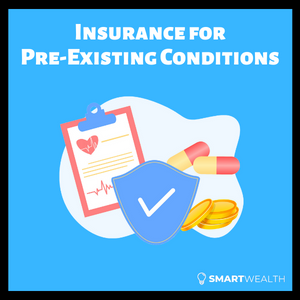Insurance is always best bought when you’re young, as the chances of you having a clean bill of health are much higher, and you’re thereby able to receive the full extent of insurance coverage.
However, some groups of people would say that insurance isn’t urgent and they can always buy it at a later age. Indeed, statistics have shown that the probability of getting a critical illness or death is greater at older ages.
But there are two things to take note of.
Firstly, such uneventful events can still happen at earlier ages, and they often have a far greater negative impact on you and your family’s finances. Secondly, even if only minor illnesses come up, they’ll still affect the chances of you getting approved for insurance in the future.
Perhaps no one has told you that before. If you find yourself in that situation, what are your options?
Although we can’t reverse time, here are some things you can do if you want to get insurance with a pre-existing medical condition.
So, read on!
What Is a Pre-Existing Medical Condition?
A pre-existing medical condition is an injury, illness, or disease that you have prior to applying for insurance.
Sounds broad? It is. But not all conditions are equal.
If you’ve visited the doctor for the common cold, cough, or fever, those typically don’t matter much in the eyes of the insurance company.
What insurance companies pay attention to are conditions which are chronic and have a long-term impact on your health.
Examples of pre-existing medical conditions:
- Asthma
- Cancer
- Stroke
- High cholesterol
- High blood pressure
- High blood sugar
- High BMI
Even if you’ve already recovered from your illness, it could still be considered a pre-existing condition.
How do you know whether what you have is material information to the insurance company? When you’re applying for insurance, there’s usually a medical questionnaire that you have to fill out. Some types of insurance plans require a greater degree of information from you; others may just require a few simple questions. You simply need to answer those questions truthfully.
SIDE NOTE When was the last time you conducted thorough financial planning or reviewed your finances? In this day and age in Singapore, doing so will absolutely improve the quality of life for you and your loved ones. Here are 5 reasons why financial planning is so important.
What Happens If You Don’t Declare Pre-Existing Conditions?
I’m sure you know the importance of having insurance.
With medical costs increasing, hospital bills (e.g., for cancer treatments) are getting more expensive, and with the increasing cost of living in Singapore, the significance of having insurance to protect your income against large medical bills is apparent.
The hard truth: those who have medical conditions might not be able to receive the full extent of coverage of the insurance they want. As such, they may contemplate whether to declare having such conditions.
As mentioned earlier, different types of insurance coverage require different levels of medical underwriting. You should always answer the medical questionnaire truthfully and accurately.
Now, what happens if you don’t?
The purpose of having insurance is the ability to claim from it when the unfortunate happens. If conditions weren’t disclosed properly upon application, claims might eventually get rejected when you need them most, rendering your policy meaningless. Such situations aren’t uncommon – you can see them in the news. Insurance companies may also void the insurance contract if a full disclosure wasn’t made or if there were inaccuracies.
When conditions aren’t declared fully while knowing the possibility of claims not being paid out, this can also psychologically affect the policy owner by causing needless doubts and worries.
This is why it’s essential to declare everything so that there and then, you’ll know whether you’re fully covered or not. And because medical conditions leave some form of trace (e.g., visits to the GP or hospital), they can’t stay hidden.
What insurance companies want is full information so that they can make a proper decision. They don’t want to deny coverage unnecessarily.
What Happens After You Declare Your Medical Conditions?
After answering the health questionnaire in the application, there isn’t much left for you to do.
Depending on the insurance you applied for, if the insurance company requires further information, they may ask for medical reports, send you for a medical appointment, etc.
Because insurance companies may have different underwriting standards (different tolerances for risk), it can be good practice to send applications to a few companies, so as to select the one with the best outcome. There are cases when applications were fully accepted at one insurer and rejected at another.
In short, the decision to accept your policy will depend on the underwriters. Your application, depending on the type of insurance, will usually fall under one of these five outcomes:
1) Accept
When a policy is accepted as standard, it’s no different from someone who has no medical conditions. If a claim is made because of a condition you had, the insurer should still pay out the claim, subject to the policy terms and conditions. Usually, these cases are accepted when the underwriters deem the health conditions as having lower impact or they’re able to accept the risk.
2) Exclude
In cases where the condition is deemed more serious, that particular condition or any related to it usually gets excluded. This means that if something happens because of it, there’ll be no payouts. However, other unrelated claims may still go through. The exact terms and conditions will be spelled out to you before you accept or reject them.
3) Load
The loading of premiums means that you’ll need to pay higher premiums. How much more you’ll have to pay will be made known to you. It can be 30%, 100%, or even 200% more than the original amount, depending on the severity of your condition. In such cases, your particular condition can still be accepted and claimed for if anything happens in the future.
4) Postpone
The insurance company usually postpones an application when there’s a lack of information that they need to make a decision. For example, if one were to recently see a specialist because of protein in the urine and there wasn’t a proper diagnosis yet, the insurance company can’t really make a conclusion. So, they may postpone the application for a period of time (e.g., one year), after which you may submit a fresh application along with new information, usually in the form of new medical reports.
DID YOU KNOW? According to a survey conducted by MoneySense, about 3 out of 10 Singapore residents aged 30 to 59 had not started planning for their future financial needs. This isn't surprising because personal finance can seem complicated and daunting. But really, there are only a few things that you should focus on. Learn how to significantly improve your personal finances with the 7-step "wedding cake" strategy today.
5) Reject
In the worst-case scenario, the application is completely rejected.
In cases of undesirable outcomes, you may still appeal; however, you would need to provide even more compelling medical reports.
What Options Are There for Those With Existing Health Conditions?
In my opinion, regular plans for the masses typically offer the best types of coverage at the lowest price points. These would be your regular term insurance, early critical illness plans, or whole life insurance.
So, those should be your first options when you’re trying to apply for insurance.
But if you’ve already applied and you haven’t received favourable underwriting decisions, here are some other options to consider.
1) MediShield Life
Medical insurance is one of the most fundamental components of a good financial plan.
Singaporeans (citizens and permanent residents) are covered by MediShield Life, which is a basic health insurance to protect against large bills at the hospital and selected outpatient treatments such as kidney dialysis and cancer chemotherapy.
One main benefit of MediShield Life is that it covers pre-existing conditions, whether they’re minor or serious.
If your condition is deemed serious, you’ll just need to pay 30% higher premiums for the first 10 years, and after that, you’ll get to enjoy the same rates as others in your age group.
Here are some examples of what are considered serious pre-existing conditions (taken from MOH):
- Cancer
- Blood disorders
- Degenerative diseases
- Heart or other circulatory system diseases
- Cerebrovascular diseases
- Respiratory diseases
- Liver diseases
- Autoimmune/ Immune System diseases
- Renal diseases
- Serious congenital conditions
- Psychiatric conditions
- Chronic condition with serious complications
However, as the objective of MediShield Life is to provide basic healthcare needs for all, the payouts are structured for B2/C wards in public hospitals. As such, if you intend to get treated at A wards or at private hospitals, expect to pay much more out of pocket.
This should be your backup if all else fails.
2) Integrated Shield Plan
As the name suggests, the Integrated Shield Plan (IP) is integrated with MediShield Life.
It offers enhanced protection, including coverage for private hospitals, on top of what MediShield Life provides.
For Singaporeans, MediShield Life combined with the IP is one of the best options for medical insurance coverage.
Currently, there are only seven insurers that provide IPs:
- AIA
- Singlife with Aviva
- AXA
- Great Eastern
- NTUC Income
- Prudential
- Raffles Health Insurance
If you have a pre-existing condition, it’s good practice to send applications to a couple of insurers. With different underwriting standards, there may be some that are more willing to accept your medical condition.
3) Specialised Life Insurance Plans
Similar to smokers, if you have a serious medical condition, do expect to pay more premiums for life insurance.
However, if you find yourself getting denied or having to pay extremely high premiums for the regular life insurance or critical illness plans, there are still options available for you.
There are plans offered by some insurance companies that can cover those who have type 2 diabetes, pre-diabetes, high cholesterol, high blood pressure, and high BMI.
Besides that, there are also insurance plans that cater to people who have already been diagnosed with cancer.
These plans are less common and have reduced coverage compared to the typical life insurance plans, but they’re better than nothing, especially if you view having insurance as crucial.
4) Self-Insure
At times, you may face a situation where there are no feasible alternatives – you’ve gotten rejected or the premiums are just too expensive.
The last resort is to self-insure.
Basically, self-insurance is to save a pool of money so that it can offset potential “losses” in the future.
While it makes sense, it’s not perfect.
Downsides to this approach include not having saved enough when the uneventful happens too soon, or when it happens, the “losses” are just too huge to bear. These, ironically, are the reasons why one should have insurance, which is why it’s always smart to get insurance when your health is good, because when you want it the most, you might not get it.
Wrapping Up
In summary, depending on the severity of your medical condition, getting insurance may be a hit or a miss.
The least you can do is submit applications to a few companies and see what they say. At least you’ve tried.
You can also go through a comprehensive financial planning session with us and weigh your options.
And if you have people around you who have yet to get any form of insurance, do let them know the importance of it as well as the challenges they could face if conditions were to come up in the future.


